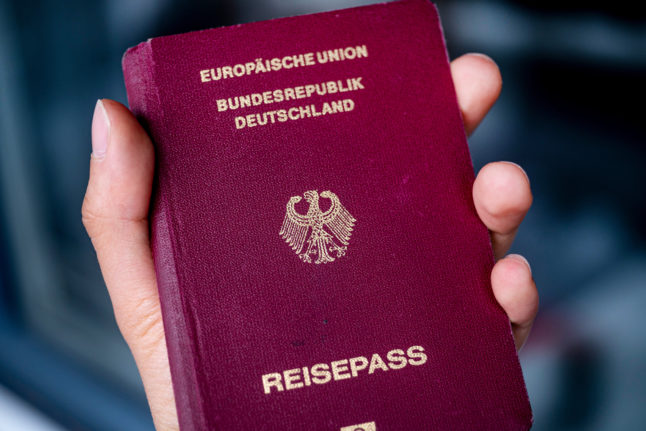At the beginning of February, Germany’s landmark citizenship law making it easier for foreigners to acquire a German passport passed a final vote, and is likely to come into effect in late May. But there’s also another way foreign nationals may be able to gain German citizenship.
Read more about applying for citizenship in our German citizenship guide.
The principle of descent
In Germany, das Abstammungsprinzip – the principle of descent – was originally the only basis for German nationality under the Reich and Nationality Act which came into force in 1914. Since then, it has been broadened by various amendments to the law.
Here is a guide to understanding who is entitled to German citizenship by descent and how to apply.
Children born to married parents
Before 1975, in almost all cases where the parents were married at the time of birth, you could become German only if your father was a German citizen.
The law was broadened slightly in 1964 so that children who would otherwise have been stateless were able to gain German citizenship if only their mother was German. This law applied until December 31st, 1974.
Then, those born to married parents after 1975 automatically became German citizens if one of the parents – father or mother – was a German citizen at the time of their birth. This rule still applies today.
READ ALSO: TEST: Is your German good enough for citizenship or permanent residency?
However, if you were born outside of Germany after December 31st, 1999 and your German parent was also born outside of Germany after December 31st 1999, then you were not born a German citizen unless your birth was registered in Germany within one year of your date of birth.
For those who were born before 1975 and after May 23rd, 1945, when the old rules about paternal inheritance still applied, there is now a possibility to become a German citizen by applying for ‘citizenship by declaration’.

This possibility came into force in August 2021 and involves submitting an application form called an Erklärungserwerb (declaration application) and proof of parentage, with documents such as birth, parentage and marriage certificates. The application procedure itself is free of charge, though you may need to factor in costs for getting documents translated or certified by a notary.
A checklist for those who are entitled to apply for citizenship by declaration is available, in German, on the Federal Administration Office’s website.
Children born to unmarried parents
Before July 1993, in almost all cases where the parents were not married at the time of birth, you could become German only if your mother was a German citizen.
If you were born before July 1993 and only your father was a German citizen, you could only become a German citizen by legitimation i.e. if your parents got married after your birth.
After July 1st, 1993, another change in the law meant that having either a German mother or father meant that a child of unmarried parents was a German citizen. However, if only the father was a German citizen, legal paternity had to be established before the child’s 23rd birthday. This meant obtaining a Vaterschaftsannerkennung (acknowledgement of paternity).

This is still the case today, and, as with children born in wedlock, if you were born outside of Germany after December 31st, 1999 and your German parent was also born outside of Germany after this date, then you do not automatically gain German citizenship. In this case, your birth must be registered in Germany within one year of your date of birth.
Adopted children
If you were adopted as a minor (under the age of 18) by at least one German citizen on or after January 1st, 1977, you automatically gain German citizenship. If the adoption took place outside Germany, the adoption must be recognized in Germany and have the same legal effects under German law to qualify for German citizenship.
German grandparents
Unlike in some other European citizenship laws, you can‘t jump a generation and apply for citizenship in Germany just because of a German grandparent. However, your parent might have acquired German citizenship by descent from your German grandparent(s) through one of the above categories, which could mean that you could also qualify as a German citizen.
People living outside of Germany
Not living in Germany doesn’t mean that you are not a German citizen under the principle of descent. However, if you want to get a German passport, you’ll need to obtain a certificate of proof of citizenship – a Staatsangehörigkeitsausweis.
To do this, you will have to fill out a form and submit it to the Federal Office of Administration, which investigates whether or not applicants are German citizens. Along with the form, you will also have to submit various documents including proof of parentage, birth and marriage certificates.
Dual citizenship
The children of a foreign parent and a German parent have a right to both nationalities, as long as the law of the foreign parent’s home country allows it.
Children born to at least one German national abroad also have a right to dual citizenship, as long as the country of their birth also recognises the principle of ‘jus soli’ – the right to citizenship to those born in the territory of a state. The parents have to register this birth with the local diplomatic mission within the first 12 months of the child’s life.
Exceptions and developments
In June 2021, the so-called “reparation citizenship” law was passed in the Bundestag, which closed legal loopholes which had led to descendants of people who fled Nazi Germany to escape persecution having their applications for a German passport rejected.
Under the new law, descendants of those deprived of German citizenship on political, racial, or religious grounds between 1933 and 1941 can claim citizenship through their parents’ restored citizenship.
READ ALSO: How Germany is making it easier for Nazi victims’ descendants to get citizenship



 Please whitelist us to continue reading.
Please whitelist us to continue reading.
your date for StAG 5 cases is a bit off. it’s 1949, not 1945. Also, for those born between 1914 and 1949 (and their descendants), they can apply via StAG 14 in conjunction with a 2019 decree (note that this requires B1 language certification).
https://www.germany.info/us-en/service/03-Citizenship/-/2479488